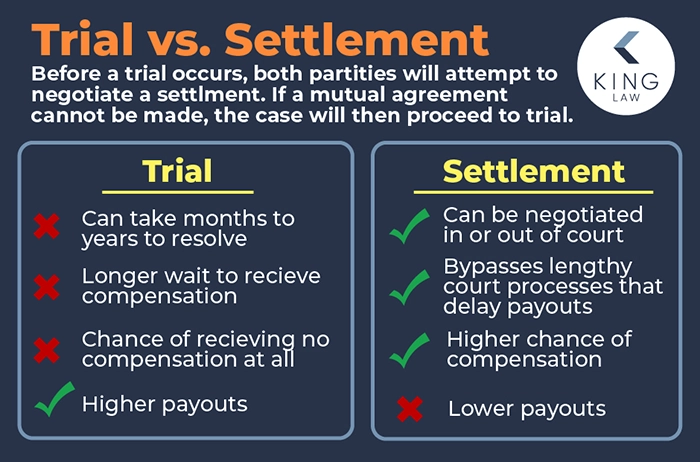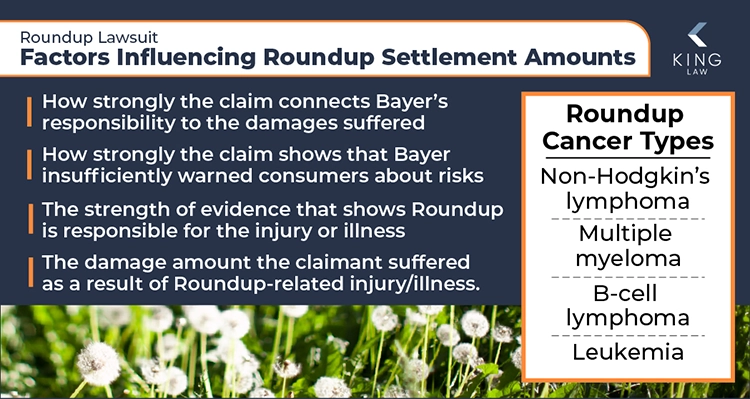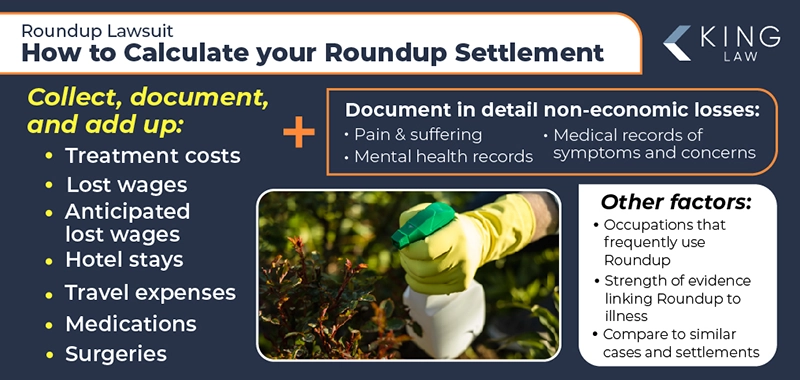
Roundup, a popular weed control product, has faced more than 100,000 lawsuits with thousands still pending. Many individuals who regularly used the herbicide developed cancer (non-Hodgkin lymphoma, in particular) from glyphosate, the active ingredient in Roundup. Lawsuits against Roundup’s manufacturer, which was Monsanto until 2018 when it was acquired by Bayer, seek to hold the company accountable for producing a dangerous product without adequate warnings. Evidence also suggests the company knew about the cancer risk and chose not to disclose it to consumers.
Overview: What Is the Average Payout for a Roundup Settlement?
The average settlement amount for Roundup lawsuits is $160,000. However, actual payouts can vary based on the details of the case. Factors that can influence compensation include severity of illness, cost of damages, associated legal fees, and strength of evidence. The points system can also play a role when there is a global settlement that must be divided up between multiple claimants. It creates tiers where factors such as severity of diagnosis put claimants in varying levels with designated compensation amounts.
Plaintiff Payout Amounts in the Roundup Lawsuit – 2024 Update
Since the dangers of Roundup’s active ingredient became well-known in 2015, Monsanto and its parent company Bayer have faced a growing number of lawsuits. According to Reuters, by January 2024, Bayer’s shares had lost 70% of their value since taking on the lawsuits against Monsanto.
February 2024: The largest verdict over Roundup resulted in a $2.25 billion award to a cable technician in a Philadelphia court.
July 2024: The number of Roundup MDL cases reached more than 4,300.
June 2024: With more than 4,200 pending cases in the California Roundup MDL, the decision was made to reduce a jury verdict from $2.25 billion to $400 million.
March 2024: Monsanto/Bayer has reached settlements with around 100,000 Roundup plaintiffs and paid around $11 billion.
April 2024: A Roundup verdict from November 2023 was reduced from $1.56 billion to $611 while $61.1 million in compensatory damages still stood.
January 2024: A judge ruled that Bayer must pay $2.25 billion to a plaintiff who used Roundup for 20 years and was then diagnosed with non-Hodgkin’s lymphoma.
2021: Roundup lawsuits saw varying results, some in Bayer’s favor until more and more cases emerged with plaintiffs suffering from non-Hodgkin lymphoma.
2020: Bayer set aside more than $10 billion to settle more than 1250,000 pending Roundup cases.
2018: Bayer acquired Monsanto and took on $63 million in pending lawsuits.
2015: The World Health Organization (WHO) shared concerns about Roundup’s active ingredient, glyphosate, and its cancer risk, sparking an influx of Roundup lawsuits.
About Roundup Settlements and Payouts:
What Is a Roundup Lawsuit Settlement Payout?
The Process and Timeline of Reaching a Roundup Settlement
Factors Influencing Roundup Settlement Amounts
Average Roundup Settlement and Payout Amounts
How to Calculate Your Roundup Settlement Amount
Roundup Settlement Point System Explained
How Long Will It Take to Get Your Roundup Settlement Check?
How Taxes Work in Roundup Settlements
What Is a Roundup Lawsuit Settlement Payout?
A Roundup settlement is an agreement that concludes disputes brought against the product’s manufacturer by claimants who suffered a severe diagnosis like cancer after using the herbicide. The claimant is agreeing to take a certain amount of compensation from the responsible party (typically Bayer) to voluntarily dismiss the case. A settlement can be reached before or after court proceedings begin, and both parties must agree and adhere to settlement conditions.
Cases that do not settle continue to trial where a verdict determines whether or not a claimant will receive compensation.
While it can result in higher payouts, there are several potential benefits to a settlement, including:
- Cases often resolve quicker—Roundup lawsuits can take months or even years to resolve in court
- Claimants may receive compensation quicker—settlements bypass lengthy court processes that can delay payouts
- Chances of receiving compensation could be higher—if a case goes to court, the jury could rule in the defendant’s favor, denying the claimant any type of compensation
In summary, victims of a Roundup-related health condition may sue the manufacturer, Bayer. Bayer may present the option to settle, in which case they offer the claimant a certain amount of money to drop the case. Claimants and their attorney can negotiate the settlement amount or decline the settlement and go to court.

How Roundup Payouts Work
Roundup payouts in mass tort settlements are determined based on certain factors of each case. Calculations take many details into account such as severity of diagnosis, age at the time of diagnosis, required treatment, associated medical bills, level of toxic exposure, emotional distress, and more. Experienced attorneys, such as those at King Law, will ensure all facets of your suffering are represented so you receive a settlement offer that reflects your personal experience. In many cases, settlements can offer a fairer distribution of funds compared to a jury verdict where you may walk away with some compensation or nothing at all.
Settlements can occur in court (even in the middle of a trial), out of court, or during the final court judgment. In mass tort settlements, damages are evaluated individually, and attorneys representing multiple plaintiffs must agree on the distribution of the settlement amount among their clients. If consensus is not reached, the settlement offer is likely to be rejected. That’s why it can be beneficial for legal teams to collaborate to ensure results in their clients’ favor.
Larger plaintiff groups can benefit from working together to strengthen their legal standing, but this may result in smaller payouts among a larger number of claimants. However, Bayer vigorously defends these cases to protect its reputation and profits, so a large group can improve the opportunity for a result in the claimants’ favor. Utilizing expert representation is crucial to help victims understand the best approach to Roundup litigation.
The Process and Timeline of Reaching a Roundup Settlement
Roundup lawsuits can be long and complex with multiple stages to reach a settlement, including:
- Case evaluation: The claimant meets with an attorney during an initial consultation to confirm their eligibility to file a lawsuit and review details of their case.
- Investigation: The claimant and their attorney will work together to collect evidence to build and bolster the case. Evidence can include medical records, treatment bills, appointment history, doctor’s notes, and more.
- Consolidation of cases: A large number of similar cases often results in consolidation through multidistrict litigation (MDL) which allows pre-trial proceedings to be handled much more efficiently.
- Filing: After consolidation, a formal complaint is filed against the defendant in the appropriate court.
- Bellwether trials: A small number of cases are tried to get a better understanding of how the cases could resolve and provide direction for potential settlement negotiations.
- Settlement: Cases can reach a settlement with both parties in agreement. If a settlement can’t be reached, unresolved cases return to their district courts.
The timeline for resolving a Roundup case can vary greatly. Some cases may resolve in weeks while others can take years because of their complexity. It’s essential for plaintiffs to file as soon as possible to avoid missing their opportunity for compensation. Each state has a statute of limitations that typically gives victims 2-3 years to file a lawsuit from the date of their injury or diagnosis.
Factors Influencing Roundup Settlement Amounts
Multiple factors can influence Roundup settlement amounts, including:
- How strongly the claim connects Bayer’s responsibility (duty of care) to the damages suffered from Roundup (failure to maintain that duty of care)
- How strongly the claim shows that Bayer didn’t adequately warn consumers about the dangers of Roundup, and that the manufacturer either knew or should have known about these risks
- How strong the evidence is showing that Roundup directly caused the injury or illness in question (this often includes expert testimonies and medical documentation)
- The amount of damages the claimant suffered as a result of their Roundup-related injury or illness (this includes economic damages like lost wages and medical bills as well as non-economic damages like pain and suffering)
Overall, evidence plays a huge role in settlement amounts. Weak cases with limited evidence could result in lower payouts while strong cases with substantial evidence can build a strong case with higher payouts.

Roundup Cancer Types
Some of the most notable Roundup lawsuits involve diagnoses of non-Hodgkin’s lymphoma, multiple myeloma, B-cell lymphoma, and leukemia, where high payouts can help with extensive treatment costs, hospital bills, travel expenses, and loss of income.
- Non-Hodgkin’s lymphoma: A cancer affecting the lymphatic system, leading to swollen lymph nodes, fever, night sweats, weight loss, and fatigue.
- Multiple myeloma: A cancer of plasma cells in the bone marrow, causing bone pain, frequent infections, anemia, fatigue, and kidney problems.
- B-cell lymphoma: A form of non-Hodgkin’s lymphoma that impacts B lymphocytes, resulting in enlarged lymph nodes, fever, night sweats, weight loss, and fatigue.
- Leukemia: A blood and bone marrow cancer characterized by the overproduction of abnormal white blood cells, leading to fatigue, infections, fever, easy bruising or bleeding, and swollen lymph nodes.
Average Roundup Settlement and Payout Amounts
Roundup lawsuit settlements could range from $5,000 to $250,000 with an average payout around $160,000. We estimate payouts to generally fall between $120,000 and $180,000. Remember, these amounts can and will vary significantly based on the unique circumstances of each case, including the nature and extent of injuries and strength of evidence.
The value of claimed damages includes many different types of losses, including healthcare costs for treatments related to Roundup exposure, lost wages due to the inability to work, pain and suffering from the illness, and punitive damages intended to hold the manufacturer responsible for their wrongdoing. The prognosis of the Roundup-related illness also plays a critical role in determining settlement amounts. More severe and prolonged health issues typically result in higher compensation. Top-tier cases, particularly those involving Non-Hodgkin’s lymphoma, may see payouts ranging from $150,000 to $250,000 or more.
Bellwether trials will also influence average settlement values. Large initial verdicts can lead to higher settlement offers for subsequent cases, while verdicts in the defendant’s favor can decrease overall settlement amounts. The substantial profits generated by manufacturers like Bayer increase the likelihood of significant settlements as companies seek to avoid prolonged litigation and further reputational damage. Settlements are often seen as the quickest way to get cases dismissed and avoid the lengthy trial process. The right attorney will exhaust all options to ensure you receive the best possible result.
How to Calculate Your Roundup Settlement Amount
Several steps are involved to calculate Roundup settlement amounts, including:
- Collect, document, and add up all medical expenses including treatment costs, hotel stays, travel expenses, medications, and surgeries both current and anticipated.
- Calculate and record lost wages thus far and anticipated based on the severity of the claimant’s diagnosis.
- Detail and document non-economic losses like pain and suffering through personal testimonies, mental health records, and medical records detailing reported symptoms and concerns.
- Collect strong evidence connecting Roundup to the diagnosis, such as with expert testimonies, scientific studies, and other reliable sources.
- Confirm high-risk occupations that frequently use Roundup, such as landscapers, groundskeepers, and farmers, who may have a stronger case.
- Compare the case to similar settlements to get a better understanding of payout potential.
- Review the points system where monetary values are assigned to certain types of cases, often classified based on the severity of illness and extent of damages.
Attorneys with experience handling such cases will be able to help you understand your compensation potential. We pride ourselves on being thorough and transparent so you have realistic expectations about outcome possibilities.

Roundup Settlement Point System Explained
The Roundup settlement point system is designed to categorize cases into different settlement tiers. Tiers are structured to determine fair compensation for plaintiffs with varying illness severity, level of Roundup exposure, age at the time of diagnosis, total medical expenses, and other circumstances.
For example, a tier 1 settlement could be $200,000-$250,000 for those with a severe cancer diagnosis, high durations of exposure (such as a landscaper) and high amount of financial damages. A tier 3 settlement could be $50,000-$100,000 with a treatable condition, moderate level of exposure, and lower amount of financial damages. This process ensures that individuals with severe circumstances are not paid the same as individuals with less-severe circumstances.
Higher points to reach a higher tier and higher payout can come from:
- Greater exposure to Roundup (in higher amounts or longer durations)
- Extensive use of Roundup at home or at work
- Loss of a family member because of Roundup exposure
- Diagnosis with a cancer type that has a poor prognosis
- Later-stage cancer diagnoses and diagnoses at an older age that require more extensive treatment
- The presence of additional risk factors such as exposure to other toxic chemicals
Plaintiffs are scored by a neutral third-party administrator who confirms the evidence accurately shows the claimant’s circumstances. The goal is to utilize an individualized approach that is equitable to all claimants though there continue to be concerns about the fairness of distribution.
How Long Will It Take to Get Your Roundup Settlement Check?
There isn’t one standard timeline for Roundup settlements. These cases can be complex and may resolve in a few weeks or could take several years. Here are some factors that can impact timeline:
- Case complexity: With multiple plaintiffs involved in Roundup litigation, handling these cases is more complex and requires more time than traditional personal injury claims.
- Number of plaintiffs: The more plaintiffs involved in a settlement, the longer the lawsuit can take because every case needs to be closely looked at.
- Willingness to settle: Resistance to settle, especially on the defendant’s end, can prolong the process.
- Post-settlement logistics: Complex mass tort cases can take a while to conclude after a settlement is reached as more claimants join the pool, distribution calculations take place, final documentation is completed, and the distribution process takes place. Some deductions may also need to happen prior to payout, such as contingency fees, medical liens, and taxes.
How Taxes Work in Roundup Settlements
IRS Code Section 104 specifies that personal physical injuries are non-taxable, so Roundup settlement payouts usually aren’t considered gross income and are exempt from taxes. However, there are some exceptions. Punitive damages and compensation for current and future lost income are typically taxable.
To avoid any potential penalties with the IRS, claimants must accurately report all settlement details, including the settlement amount, if it was a lump sum or multiple payments, and how much was paid for legal fees. Plaintiffs are encouraged to maintain documentation throughout the entire legal process to ensure all information is up-to-date and accurate when reporting to the IRS.
A reliable attorney can help plaintiffs understand their tax liabilities, exemptions, and tips for filing taxes after receiving a settlement. This can help provide peace of mind after navigating a difficult diagnosis and complex legal process.
Settlement and Payout Distribution in the Roundup Lawsuit
Each plaintiff who is part of the Roundup lawsuit receives their own settlement based on their specific case. Payouts vary greatly based on circumstances like severity of illness, extent of toxic exposure, and amount of damages.
Amounts are agreed up before or after the lawsuit is filed, hopefully with each plaintiff feeling that their personal losses were addressed through their payout. If the defendant offers a group settlement, all of the plaintiffs’ attorneys must agree to how much their client will receive. If they don’t, the offer may be rejected, and plaintiffs may decide to pursue further legal action for a higher compensation amount.
Once a settlement is reached, a settlement fund is set up, typically with a points or tiered system to ensure varying payouts for different cases. Plaintiffs will receive their individual payouts from the settlement fund based on their assigned points or tier. Distribution methods may vary, such as pro rata where everyone gets an equal share of the damages. Matrix distribution is more common, which is when compensation varies based on the case.
Contact a Roundup Lawyer
If you or a loved one have been impacted by harmful Roundup exposure, reach out to King Law. Decades of collective experience handling environmental toxic exposure cases allow us to represent our clients with confidence, resourcefulness, and compassion. We are dedicated to securing the compensation you deserve while seeking justice against those responsible for causing your pain and suffering. Contact us today for a risk-free consultation to learn more about your legal options.
Frequently Asked Questions (FAQs)
Learn more about Roundup settlement amounts by reading answers to frequently asked questions.

